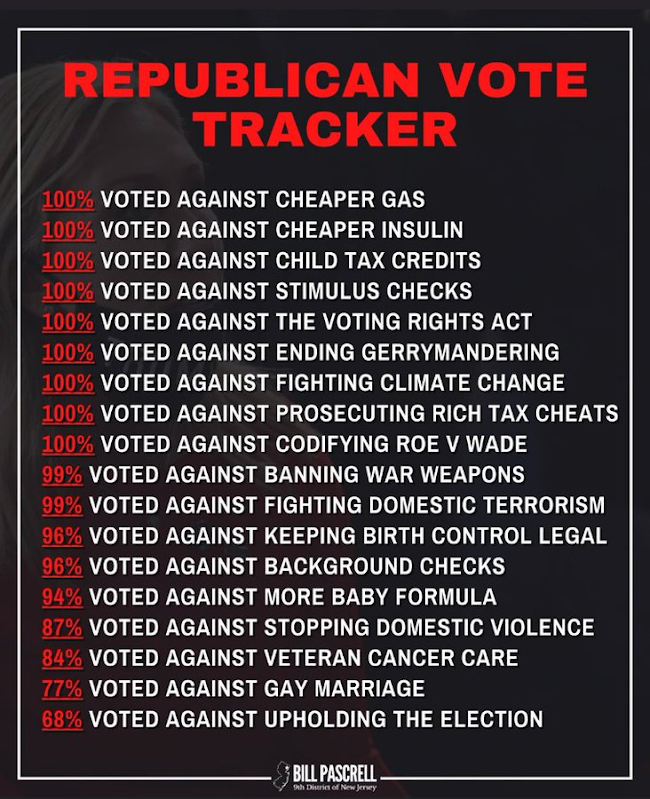Thursday, August 29, 2024
Georgia Republicans start the steal
Georgia Republicans start the steal
Trumpers are preparing for November shenanigans.
Aug 29, 2024
On Tuesday, the
Democratic Party of Georgia and the DNC sued Georgia’s State Election Board
(SEB) to block two new rules that would allow local election boards to throw a
monkey wrench into the upcoming vote certification.
With the ostensible goal
of promoting faith in elections, Republicans on the SEB have done the exact
opposite, handing local officials a tool to sow mistrust and potentially even
refuse to certify the outcome in places like Atlanta, where Democrats rack up
large numbers of votes. Had such a tool been available to Trump and his allies
in 2020, he might have succeeded in pressuring state legislators to reconvene
and steal Biden’s electoral votes, flipping the state.
As ProPublica noted, the SEB rejected a virtually identical
rule change in May, calling it patently illegal. But since then, moderate
Republican election lawyer Ed Lindsey was replaced on the board by MAGA
Republican Janelle King, and suddenly changing the rules
became kosher.
At a rally in Atlanta on
August 10, Trump praised King, along with Janice Johnston and Rick Jeffares,
the two board members who voted with her to pass the rule change, calling them
“pit bulls fighting for honesty, transparency, and victory.” (Watch below —
video via Greg Palas.)
In contrast, Georgia’s
Republican Secretary of State Brad Raffensperger decried the “11th-hour effort to impose new
activist rulemaking that would undermine key provisions of Georgia’s Election
Integrity Act.”
The plaintiffs warn of
“chaos” if the rules are allowed to go into effect, potentially allowing
Republican election officials to disenfranchise thousands of voters and
overturn the election. And we all know how Trump and his allies can be in a
chaotic moment.
GOP elections board seeks to “clarify” the law
Under Georgia election
law, elections are overseen by superintendents, usually made up of a
politically-appointed county electoral board. They play an important role in
conducting and tabulating the vote, but, as the petition points out, that role
is largely ministerial.
Under GA Code § 21-2-70, the superintendent “shall
perform all the duties imposed upon him or her by this chapter” including an
obligation to “receive from poll officers the returns of all primaries and
elections, to canvass and compute the same, and to certify the results thereof
to such authorities as may be prescribed by law.”
The use of the word
“shall” is a clear signal that the obligation is non-discretionary, and the
statute does not contemplate withholding certification until members of the
board are satisfied that the election has been fairly conducted. Their job is
to administer the election in accordance with the law, ensure the votes are
correctly tabulated, and then, within six days, to certify results and submit
them to the state. And that’s it.
If there is fraud, Georgia law has established procedures to challenge election results once certified — and it involves the board members producing evidence to investigators, not becoming investigators themselves.
And yet, on March 26,
Fulton County Board of Registration and Elections member Michael Heekin filed
a petition to amend the SEB rules to impose an
affirmative obligation on superintendents to “attest, after reasonable inquiry,
that the tabulation and canvassing of the election are complete and accurate
and that the results are a true and accurate accounting of all votes cast in
that election.”
This wasn’t just an
academic concern for Heekin, who voted against certifying the Democratic
presidential primary election in March. His petition for what became known as
the “Reasonable Inquiry Rule” sought to impose an additional requirement on
superintendents to DO UR OWN RESEARCH before doing their IRL jobs.
Then on June 17, Cobb
County Republican Chairwoman Salleigh Grubbs submitted a second petition proposing to “clarify” that local
officials have wide latitude to investigate election fraud and withhold
certification of the vote if they suspect foul play.
“[S]ome outside entities
have asserted that the certification of election results in a county is nothing
more than a ministerial task and that the members of the board have no
discretion but to rubber stamp results — sight unseen,” she scoffed, suggesting
that her proposed rule would “ensure that members of the County Boards can
perform, at minimum, their statutory duty unencumbered by outside influences
and misunderstanding of the law.”
The so-called “Examination Rule” allows superintendents, including the individual county board of election members, to examine all the voting materials to satisfy themselves of the result prior to certification.
Why shouldn’t we let local boards DO UR OWN RESEARCH?
The Atlanta
Journal-Constitution reports that at least 19 election board
members refused to certify elections since 2020.
In May, Fulton County
Election Board member Julie Adams refused to vote at all to
certify the results of the May primary. Adams is prodigious election denier, affiliated with
the Election Integrity Network and the Tea Party
Patriots who sued the Fulton County Board of Elections
demanding access to ever more granular election data, in hopes of finding the
proof of fraud she was sure existed. Election officials told her that the information was not
readily available and that she wasn’t entitled to it by law, but Adams simply
withheld her vote.
The other four members of the board, including Heekin, voted to certify, making Adams’s refusal to do her job irrelevant. But 40 percent of the Fulton County Election Board has already expressed interest in refusing to certify elections, and the problem is not confined to Fulton County. Gwinnett County Board Member David Hancock, an election denier, voted against certifying the May primary over purported concerns about chain of custody for the ballots.
On a party-line vote,
the SEB passed both proposed rules on August 19, greenlighting Heekin, Hancock,
and Adams’s request to LARP as members of the Bloodhound Gang and potentially
decertify any election result they don’t like. This is perhaps unsurprising in
light of revelations by independent reporter Justin
Glawe in Rolling Stone that SEB member Janice Johnston was in close contact
with Heekin, Adams, and Hancock, as well as other election denying board
members across the state, to craft a rule that would give them cover to delay
certification and demand more documents in their fruitless quest to find the
vote fraud they are sure is lurking around every corner.
The lawsuit
The plaintiffs argue that the new rules allow board members
to conduct extra-legal investigations and withhold certification in defiance of
state law. Under Georgia’s election statutes, superintendents have to compare
the tally of votes cast with the total voters in each precinct and can order a
hand recount in specific circumstances to reconcile any discrepancies. But, the
plaintiffs contend, “Once mathematical accuracy is attained, the superintendent
has no discretion to refuse certification.”
They insist that the
“Reasonable Inquiry Rule” violates the “shall” provision of GA Code § 21-2-70
and invites board members to conduct illegal investigations, transforming a
mandatory obligation into a discretionary exercise. And the “Examination Rule” invites
board members to run out the clock with demands for extraneous documents, and
then cite the lack of evidence as a reason to deny certification.
“The primary (and
narrow) purpose of county certification is to ensure that the aggregate
tabulation is numerically accurate,” the plaintiffs argue. “Other steps in the
election process — which occur both before and after county certification —
address the possibility of fraud. These steps include voter registration, voter
verification at the polls, the risk-limiting audit process, and the
election-contest process.”
They demand a
declaratory judgment from the court that certification of election results is
non-discretionary and cannot be delayed to allow board members to spelunk
through the documents, and, “to the extent either the Reasonable Inquiry or
Examination Rule fails to comply with the Georgia Administrative Procedure Act,
it is an invalid and unlawful exercise of SEB’s authority.”
Now what?
The case was assigned to
Judge Robert McBurney, who presided over the grand jury in Fulton County which
indicted Donald Trump and 18 of his allies for conspiracy to commit election
fraud. He’s an experienced judge who will certainly handle the matter both
fairly and expeditiously. But the timing of these rules, which go into effect
in September, virtually guarantee that the matter will be mired in litigation
throughout the election — which is not an accident.
“At minimum, these novel
requirements introduce substantial uncertainty in the post-election process and
— if interpreted as their drafters have suggested—invite chaos by establishing
new processes at odds with existing statutory duties,” the plaintiffs warn.
Whether or not it
succeeds, the fight over the rule will itself feed the self-perpetuating cycle
of Republicans fomenting lies about election fraud, and then pointing to the
public’s belief in those lies to justify further intrusion into the electoral
process. And that, for Republicans, is an end in itself.
Wednesday, August 28, 2024
Tuesday, August 27, 2024
NEW INC. MAGAZINE COLUMN FROM HOWARD TULLMAN
How to Make Sure You're Taking Care of Your Top Performers.
It's way too easy to
neglect the people you rely on, because they usually don't need your help to
get important things done. But they do need recognition and reward.
Expert Opinion By Howard
Tullman, General managing partner, G2T3V and Chicago High Tech
Investors @howardtullman1
Aug 27, 2024
There remains a pressing
need at this critical and uncertain period in our country's future for every
concerned business leader to take the time to take care of team members. Whether they tell
you outright, keep these concerns to themselves, or discuss them with peers and
family, there's no one who isn't more than a little anxious about their
continued employment, their company's prospects, and their continuing role in
the business.
Now's not the time
to start losing key players because you haven't been paying attention to
them and anticipating their needs. Important contributors are often the first
to bail without notice because they've got plenty of alternatives and
unfortunately, they rarely leave alone. As often as not, they leave because
they've reached a point where they're no longer willing to do it just for the
money. They're looking for a lot more in the way of challenges, job
satisfaction, appreciation, and ultimate rewards. When they're part of a small
and tight working team, especially if they're engineers or computer scientists,
their departure can trigger a flood of folks following them out the door.
The reasons that
management must get involved in these ongoing conversations are obvious -- and
selfish in some ways as well. If you don't care about reassuring, recognizing
and rewarding your people, you won't have to worry about retaining them. We all
understand that it's the people who are the irreplaceable foundation of every
successful business. Your back-seat-driving board members and impatient
investors may tell you that no one is irreplaceable, which is easy for them to
say from the comfort of their box seats. But you're the one who has the
day-to-day task of keeping the team happy, focused and together. And words
alone won't get the job done, actions speak much louder and show everyone that
you're willing to put your money where your mouth is -- even if money isn't the
only concern.
I've come to believe
that - while everyone agrees with the basic idea - there are a lot of valid
questions about both the means and the methodology of keeping your team intact
and innovative.
As to the means, even if
you're fortunate enough to have the spare change to make the right financial
gestures, which most companies don't have right now, dollars alone aren't going
to be enough. Money may be the way that people without talent keep score, but
the best people are looking for a lot more than just a few incremental bucks.
And in the current environment, far out of the money options aren't much of an
incentive either.
The best people in your
business came aboard as believers - they bought into the vision, they
wanted to do meaningful and challenging work, they wanted the work to
matter, make a difference. And maybe most of all, they wanted to be
in a place where they had a chance to learn and keep learning the things that
money just can't buy. The smartest entrepreneurs chase the vision, not the
money. They know that if you deliver on the dream, the money will follow.
But, after enough time
passes, it's critical to try to refresh and renew the program; revise and
restate the objectives; and reiterate the ultimate goals for the key members of
the team because even the most exciting projects can grow stale. There's
always more to do than time allows, people's patience wears thin, and the story
they were sold seems to shrink and keep receding into the distant future. It's
a truism in technology that software development is a few moments of creation
and a lifetime of maintenance. Finding the final few bugs in the latest release
is less exciting when you've been doing it for a decade and the accolades are
fewer and far between.
The challenge becomes a
chore, and the job looks like an endless journey.
As to the methodology,
it turns out that I needed to be more precise and targeted in my proposals and
- in particular - to avoid the idea that treating everyone a little bit better,
but all basically the same, made sense. Trying to spread relatively scarce
funds across a large group of team members - being a mile wide and an inch deep
- becomes more of a disappointment to everyone than anything effective. More
importantly, trying to please everybody - however you try to do it - never
works. Even if it's milk and honey rather than tar and feathers, you can't
paint everybody with the same brush. The best plans focus on equity rather than
equality and they're based on strengths, skills, and a demonstrated and
continued commitment.
The crucial
consideration today is identifying the critical keepers and specifically
addressing their needs and desires which, as I noted above, are usually about a
lot more than money. These are the ones on whom the business depends for their
expertise, accumulated knowledge and experience, customer connections and
relationships, and leadership. Focus on the top 10% of the people in each area
and concentrate your efforts on them if you're looking for real results. The
top performers work harder and longer and contribute exponentially more to the
effort than the typical employees and need to be rewarded accordingly.
Although there's no
one-size-fits-all solution, we know for sure that the two things people want
more than sex or money are recognition and praise. Silent gratitude is of no
use to anyone and it's easy for a hard-working team doing complicated tasks to
feel misunderstood and unappreciated. In addition, the top talents want direct
responsibility, independence, new challenges, and the time and necessary
resources to finish what they've started without concessions or compromises.
There's a lot of pride
in the creation process and an important sense of purpose as well. The players
need to believe that they're trusted by the management and owners and that
those folks - however distant and clueless they may be about the development work
itself - still care greatly about the people who are actually making things
happen and appreciate that the business would be nowhere without them.
The bottom line is that
there's no end to the talent retention process and there's no one today whose
loyalty and commitment should be automatically assumed and, worse yet, taken
for granted. If you want to keep your best people, you've got to keep at it and
double down on the ones you can't afford to lose.
Monday, August 26, 2024
Sunday, August 25, 2024
Saturday, August 24, 2024
LINKS TO RELATED SITES
- My Personal Website
- HAT Speaker Website
- My INC. Blog Posts
- My THREADS profile
- My Wikipedia Page
- My LinkedIn Page
- My Facebook Page
- My X/Twitter Page
- My Instagram Page
- My ABOUT.ME page
- G2T3V, LLC Site
- G2T3V page on LinkedIn
- G2T3V, LLC Facebook Page
- My Channel on YOUTUBE
- My Videos on VIMEO
- My Boards on Pinterest
- My Site on Mastodon
- My Site on Substack
- My Site on Post
LINKS TO RELATED BUSINESSES
- 1871 - Where Digital Startups Get Their Start
- AskWhai
- Baloonr
- BCV Social
- ConceptDrop (Now Nexus AI)
- Cubii
- Dumbstruck
- Gather Voices
- Genivity
- Georama (now QualSights)
- GetSet
- HighTower Advisors
- Holberg Financial
- Indiegogo
- Keeeb
- Kitchfix
- KnowledgeHound
- Landscape Hub
- Lisa App
- Magic Cube
- MagicTags/THYNG
- Mile Auto
- Packback Books
- Peanut Butter
- Philo Broadcasting
- Popular Pays
- Selfie
- SnapSheet
- SomruS
- SPOTHERO
- SquareOffs
- Tempesta Media
- THYNG
- Tock
- Upshow
- Vehcon
- Xaptum
Total Pageviews
GOOGLE ANALYTICS
Blog Archive
-
▼
2024
(1070)
-
▼
August
(63)
- TRUMP IS A CROOKED TRAITOR AND A FAT PIG
- ABC DEBATE RULES
- HOWARD TULLMAN JOINS LISA DENT ON WGN RADIO TO DIS...
- Georgia Republicans start the steal
- NO ONE
- TRUMP IS CRUMBLING
- NEW INC. MAGAZINE COLUMN FROM HOWARD TULLMAN
- TRUMP
- EUROPE IS FINALLY WAKING UP TO THE POISON OF ISLAM
- CRUZ IS A CROOKED TRAITOR
- FORWARD
- we-me
- PRISON SENTENCE
- MAGA MORONS - LIARS, TRAITORS AND CROOKS
- HOWARD TULLMAN JOINS LISA DENT ON WGN RADIO
- LOOP NORTH NEWS - GENERATION CHATBOT
- UNDECIDED ? REALLY?
- NEVER FORGET WHAT THIS CROOKED CONVICTED FELON DID...
- LEAF BLOWER
- NEW INC. MAGAZINE COLUMN FROM HOWARD TULLMAN
- LIES AND MORE LIES FROM THE DEMENTED CONVICTED FELON
- Rachel Maddow: What Worries Me Most About Election...
- STODDARD - Will the Democratic Convention Break Tr...
- ALMOST IMPOSSIBLE
- Candidate Kamala Harris hasn’t sat for interviews....
- THE BEST TRUMP PROJECTION EVER - CHICAGO STICKS IT...
- MAGAt Traitors and Scum
- LET'S NOT FORGET THESE OTHER CROOKS, CRIMINALS AND...
- IN YOUR GUTS, YOU KNOW HE'S NUTS
- CONGRATS TO THEA ON A SUCCESSFUL SUMMER SONG WORKSHOP
- CADET CRIMINAL BONE SPURS
- Gene Lyons
- Joyce Vance
- AT THE AGE
- TRUMP CHEATS
- Addled Lying Monster Trump is the Best Trump You'l...
- To Save Conservatism From Itself, I Am Voting for ...
- NEW INC. MAGAZINE COLUMN BY HOWARD TULLMAN
- THE OLYMPICS OF LYING - CONVICTED FELON TRUMP TAKE...
- MAZEL TOUGH
- ANOTHER CROOK IN THE HOUSE - NO BANK ACCOUNTS BUT ...
- THIS PLACE IS PACKED
- WHERE IS DIRTY DIAPERED DONALD HIDING OUT THESE DAYS?
- HOWARD TULLMAN JOINS LISA DENT ON WGN RADIO TO CHA...
- CROOKED MAGA SCUMBAGS AND TRUMP ALREADY PLANNING T...
- New INC. Magazine column from Howard Tullman
- HAT RECOMMENDATION FOR KAMALA EVENT MUSIC TRACK AD...
- UN fires additional staffers after probe finds pot...
- DOUCHEBAG DUCKS DEBATE
- HOME OF THE CONVICTED FELON AND RAPIST
- TRAITOR OF THE YEAR
- HE'S DEMENTED AND OUT OF CONTROL...
- SEND HIM TO THE BIG HOUSE (JAIL)...NOT THE WHITE H...
- SILVER ALERT
- TOO CHICKEN TO DEBATE
- CONVICTED FELON TRUMP'S TRIAL IN D.C. IS BACK IN B...
- DON-OLD SAYS IT ALL
- HOW MUCH LONGER WILL WE TOLERATE THIS EMBARRASSING...
- HOWARD TULLMAN JOINS LISA DENT ON WGN RADIO TO DIS...
-
▼
August
(63)


















































